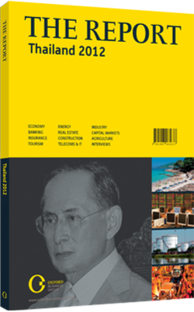OBG talks to Lyonpo Khandu Wangchuk, Minister for Economic Affairs, Kingdom of Bhutan

Interview: Lyonpo Khandu Wangchuk
What is the thrust of the bilateral economic relationship? How high do economic ties rank?
LYONPO KHANDU WANGCHUK: As two Buddhist kingdoms whose monarchs are revered for their benevolence, love for their people and vision, Thailand and Bhutan enjoyed close relations even before the establishment of formal diplomatic ties in 1989. The links have grown rapidly over the years. There is a close affinity between our royal families, people and governments. There is also strong commitment to further enhance our relations and cooperation on a variety of fronts.
On the economic front, Thailand is a major source of imports for Bhutan, and in recent years we have seen an increasing range of consumer goods from Thailand. Bangkok is the number-one destination for thousands of Bhutanese travellers. Druk Air has daily flights to Bangkok and we expect more flights in the coming years. In 2011 we received a Thai trade delegation of over 40 members on a mission to explore business opportunities. They were well received by our business community. There is also an investment by a Thai company in our hotel sector. In the tourism sector, Thais are among the10 largest markets for us. We held a roadshow in Bangkok in 2010 to encourage more investment. Recognising the importance for closer trade relations, we have initiated negotiations on a preferential trade agreement with Thailand.
What lessons can Bhutan and Thailand learn from each other’s economic development strategies?
WANGCHUK: Bhutan is particularly interested in the success of Thailand’s small and medium-sized enterprises as well as its promotion of traditional Thai art and crafts and the food processing industry. Many of our officials have visited Thailand’s royal projects, industrial estates, farms and industries, and we see that the strategies have been well designed. Overall, Thailand’s dual-track development strategy of attracting foreign direct investment and promoting exports of manufactured goods, and stimulating domestic demand is an important strategy that we can learn from. We can share our experiences with environmental conservation and economic development, our grassroots-based five-year planning and our hydropower knowledge. We have seen an increasing number of high-level contacts and visits between government officials of both the countries. Thailand also offers scholarships for Bhutanese students and there are many Thais working in development projects in the country.
How can economies such as those of Bhutan and Thailand drive higher-value tourism?
WANGCHUK: Thailand has a very large tourism industry and caters to all the market segments from budget to ultra luxury. Thailand offers a diversity of culture, geography and products for high-value tourism. For my own country, Bhutan faces stiff competition from many destinations, even in the high-end segment, and it is important for us to position ourselves as a unique and once-in-a-lifetime experience for visitors. To market this concept we have a new Bhutan logo with the tagline “Happiness is a Place”. We are promoting investments in luxury hotels by allowing 100% foreign ownership and encouraging our hotels to upgrade to at least a three-star category. To tackle infrastructure challenges, the national airline is planning to expand to new destinations and a new airline has been approved.
However, even high-end tourism is not without its share of problems. A couple flying in a private jet over generates a much larger carbon footprint than 114 passengers travelling in one of our Airbus 319 jets. We want to encourage more per-capita spending by a small group of tourists rather than expanding the number of visitors because we can never compete in the mass tourism market. Many of Bhutan’s historical and cultural attractions are not designed for very large number of visitors. Some of these institutions are still places of worship and are an integral part of Bhutanese life; we want to allow visitors to enjoy the beauty and charm of the country in solitude without being disturbed.
You have reached the limit of premium articles you can view for free.
Choose from the options below to purchase print or digital editions of our Reports. You can also purchase a website subscription giving you unlimited access to all of our Reports online for 12 months.
If you have already purchased this Report or have a website subscription, please login to continue.

